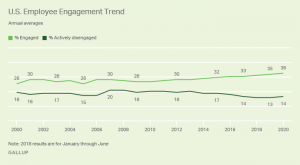
A couple of weeks ago we were happily following our daily routines. We grabbed our coffee mugs, slowly walked over to our teams and chatted with them. If there was a problem, people approached us (or we approached them), we hopped into a meeting room and solved the issue. We knew what our teams were doing. For lunch, we grabbed our colleagues and our biggest problem was if we wanted to go for Asian or Italian food. These times are over. Suddenly, from one day to the next, we are confined to the walls of our home office spaces. Our spouses and kids are screaming for our attention, our wireless connection is stuttering, and our apps are quitting on us due to heavy use. On top of that, we fear for our loved ones and don’t know how severely the economic aftermath will hit us. In this scenario, our bosses still expect us to lead our teams and deliver exceptional results. That’s a challenge.
The VUCA-world
I fully understand you, because I am in exactly the same situation. I also fear for my loved ones and my economic existence. However, for me as an Agile Leader, the general perception of the world is that it is volatile and uncertain. Also, I believe “black swan” events [1] (events nobody believes to be possible until they happen) to be the norm rather than the exception. We just don’t know what they will be and when they will happen. What we all experience at the moment is Volatility, Uncertainty, Complexity and Ambiguity. Have you already heard of those four words? Take the initial letters and you get VUCA. VUCA is an acronym coined by the U.S. Army War College around 1987 [2].
From an Agile point of view, we have been living in a VUCA-world for quite some time already. It’s just that now, in the middle of a black swan event, everybody realizes it.
The ones – people and businesses – who learn to deal with it will thrive. The ones who don’t will plummet and go out of the market.
This means, you as a leader are needed now. The skills to deal with uncertainty are useful far beyond the Corona crisis.
Stay Calm
Some Leaders are panicking. Don’t. Stay calm. Our families and teams are looking up to us. They will follow our example. If we can keep a cool head, they have a fair chance to mimic this. In times like these, people need stability. When everything else is volatile, we as their leaders have to be the pillar of strength and stability for them. This can be achieved through us acting as role models, and also through routines, processes and clear goals. If we act mindlessly, our teams might fall apart or suffer mental stress beyond necessity.
In order to keep mental stress from them, we need to be relaxed ourselves. Use meditation techniques and don’t forget to exercise, that’s helpful for serenity. Let’s also keep in mind that, while we don’t know what will happen tomorrow, we do know what we can do today.
Decide
Some leaders, especially those who are panicking, are either not deciding anything at all, or going into a decision-frenzy that calls for a new direction twice a day. Neither is helpful, even though understandable. We can spot this in the animal world: When threatened, some animals feign death. They just fall over and won’t move an inch, no matter how close the predator comes. Others run as fast as they can, darting sideways or zigzagging in order to get away. Others turn around and fight. Human beings act in similar ways, when in fear. I want us to belong to the last group. I want us to fight, instead of freezing or fleeing.
Let’s gather ourselves and use our cerebrum rather than our brain stern. Let’s think. Let’s go back to what we have learned over the years. Everything we need is probably already there. Let’s orient ourselves, evaluate the situation and try to get all known facts onto the table. Then, we make our call.
The difference in these times is, that we can only drive by sight – and sight is very limited. All decisions affecting a longer period of time are subject to change, while “longer” today means a week or two. Dr. Michael J. Ryan, Executive Director of the WHO Health Emergencies Programme, has a clear view on decision making [3]:
“Speed trumps perfection. And the problem in society we have at the moment is, everyone is afraid of making a mistake, everyone is afraid of the consequence of error. But the greatest error is not to move. The greatest error is to be paralyzed by the fear of failure.”
While Dr. Ryan was talking about fighting the Coronavirus as societies, I strongly believe this to be true for enterprises and leaders as well. Let’s not try to make perfect decisions. Make small ones, learn from them and adapt our approach accordingly. Not to move means the competition will leave us in the dust.
Care for People
We also need to acknowledge that we are not the only ones confronted with this new situation. Our people, be it family or business acquaintances, are in this as well. Today, nobody knows if we are just facing four difficult weeks, or if we will have to deal with this “lockdown” for several years. Our stress levels will grow, and very soon the first people will suffer from loneliness and other mental issues. This means we have to care for our people. We need to check in with them regularly. We need to create room for social interactions, for example, five to ten minutes at the beginning of every meeting. We need to help everybody feel welcome, understood, appreciated and loved. We can do this by listening to people. Everyone will deal differently with the situation and has different needs at different times. We can do this by carefully choosing how and when we talk with people, always being conscious that in virtual interactions a lot of information we usually have is missing. Less facial expressions are recognizable in these small video boxes and body language often becomes completely invisible. This means, we have to be even more cautious and understanding in our daily interactions with one another than we would in our regular contexts and we need to improve our verbal communication skills. When did you last check-in with one of your team members, just asking how they are and what they were up to during the weekend?
Learn new skills
In order to do this, we will probably need to learn new skills. Some of them are hard skills, e.g. using the right hardware and software for remote meetings and using these well. But most of what we have to learn will be soft skills. How do we communicate right? How can we facilitate well in a remote work situation? How can we spot and solve conflicts when people can just turn off their webcams? How can we deal with severe stress? How can we deal with change in extremely volatile situations? How can we make decisions in highly uncertain environments?
We need to learn what the personal and social needs of our teams are. Usually, we don’t have to do this to such a high extent, because they could take care of it themselves. Now they miss their watercooler talks and joint lunch break. Let’s not underestimate the importance of this and sharpen our skills!
Don’t settle for mediocrity
In all of the things mentioned above, don’t settle for “good enough”. Strive for “we are great at this!”. The reason behind it is, that what people consider “good” today will be “poor” in just a couple of weeks. We are just learning how to deal with an exceptional situation like this and we are all starting at a very basic level. However, we will catch up quickly. While it might be sufficient to dial into a videoconference with your 5-year-old webcam in a badly lit room today, this won’t suffice in a couple of weeks from now. The same goes for processes: We can deliver a two-day training today virtually, just as some of us would have in the past: with 200 slides in sixteen hours straight. However, the needs in a remote situation like this are different. If we don’t adapt, our competitors surely will.
Go for it!
The current situation is dire and pushed us right out of our comfort zones. We are faced with a black-swan event in the VUCA world. This is an opportunity though. Let’s get our act together. Let’s:
- Stay calm, because our people need stability and we are the role models.
- Make small decisions quickly, using our brains rather than our guts, learn from them and adapt.
- Care for our people and make sure everybody feels welcome, understood, appreciated and loved.
- Learn new skills swiftly, so we can thrive in the current situation and are not overwhelmed by the circumstances.
- Don’t settle for mediocrity, or our competitors will exploit this weakness.
If we succeed here, we will come out of this crisis strengthened and more successful than ever. This is my firm belief. Let’s do it!
What is your greatest issue as a leader right now? What is keeping you up at night? Let me know through LinkedIn or leave a comment below this article, maybe we can learn together.
Sources
[1] https://en.wikipedia.org/wiki/Black_swan_theory
[2] https://en.wikipedia.org/wiki/Volatility,_uncertainty,_complexity_and_ambiguity
[3] Minute 31:50 – 32:06, https://www.youtube.com/watch?v=Gi69S1UNAVA&feature=youtu.be
Image by Arek Socha on Pixabay
Business & Finance Articles on Business 2 Community
(54)
Report Post





